15 Companion Plants For Cantaloupe & What To Avoid! [2023]
Companion plants for cantaloupe are actually plants that can be grown alongside cantaloupes.
These plants help the cantaloupe to grow faster and stronger.
If you’re looking to add some new plants to your garden this year, why not try companion planting with cantaloupe?
Companion planting is a great way to improve yields and deter pests.
In this article, I will share with you some of the best companion plants for cantaloupe. These plants will help your cantaloupes to be free from pests and diseases and thus grow healthy cantaloupes.
I will also share with you a few plants that you should avoid planting next to cantaloupes. I hope that after reading this article you will have a very good idea about companion plants for cantaloupe.
Before I go into the details, here is a list of 15 companion plants for cantaloupes.
1. Marigold
2. Chamomile
3. Dill
4. Violets
5. Radishes
6. Lettuce
7. Spinach
8. Collard Greens
9. Bush beans
10. Corn
11. Bee balm
12. Alliums
13. Nasturtiums
14. Basil
15. Carrots
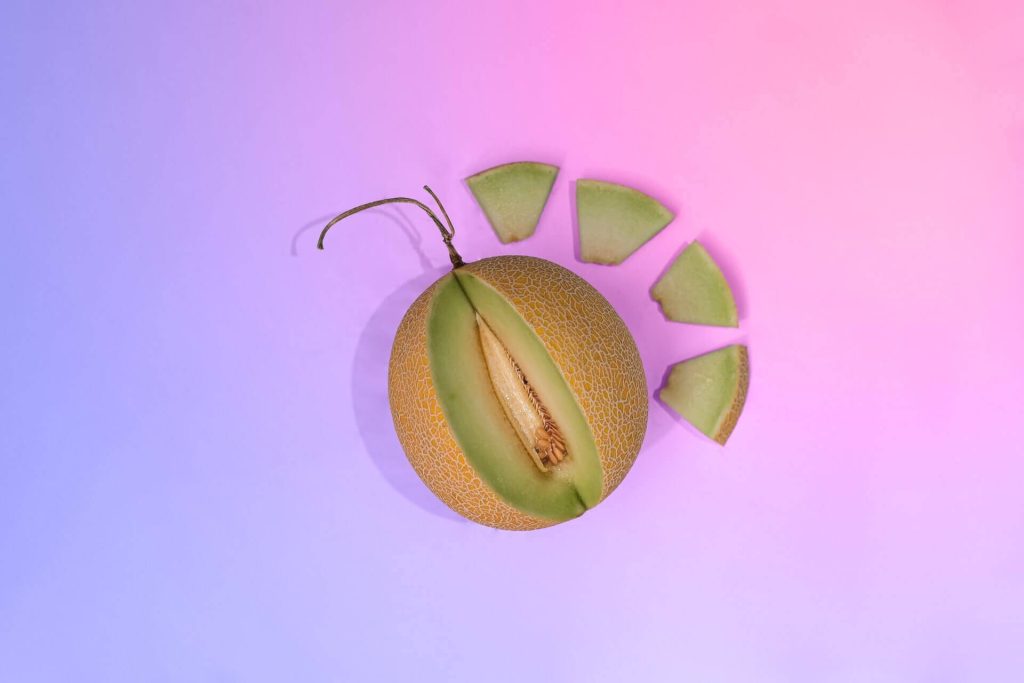
Affiliate Link Disclosure
Some of the links on here are affiliate links and I may earn if you click on them, at no extra cost to you. Hope you find the information here helpful.
Related Posts
- Companion Plants For Leeks: 17 Plants That Will Boost Growth
- 27 Companion Plants For Mint To Thrive (And Avoid!)
- 17 Companion Plants For Pumpkins-Help Them THRIVE!
Recommended Companion Plants For Cantaloupe
It would be a good idea to prepare a cantaloupe companion planting chart before you start planting cantaloupe companion plants. This will give you a clear idea as to what grows well with cantaloupe and vice-versa
Here are some of the best cantaloupe companion plants:
1. Marigold
Marigolds repel harmful insects and thus improve the cantaloupe harvest.
2. Chamomile
Chamomile also repels best and helps the cantaloupe plants to grow healthy and juicy fruit.
3. Dill
Dill is one of the best companion plants for cantaloupes. Dill acts as a pest repellent and helps the cantaloupes to produce a bountiful harvest of delicious fruits.
Dill grows well in areas that have a good sunshine and well-drained soil.
Cantaloupes also grow well in similar conditions. Ideally, dill and cantaloupes should be planted approximately 24 inches apart so that they can grow properly.
4. Violets
Violets assist cantaloupes to grow in a healthy environment by keeping the soil cool and moist. Violets also helped by repairing harmful insects.
5. Radishes
Radishes are a very good companion plant for cantaloupes. They keep the soil aerated and loose. So planting radishes around your candle will help them to grow healthy.
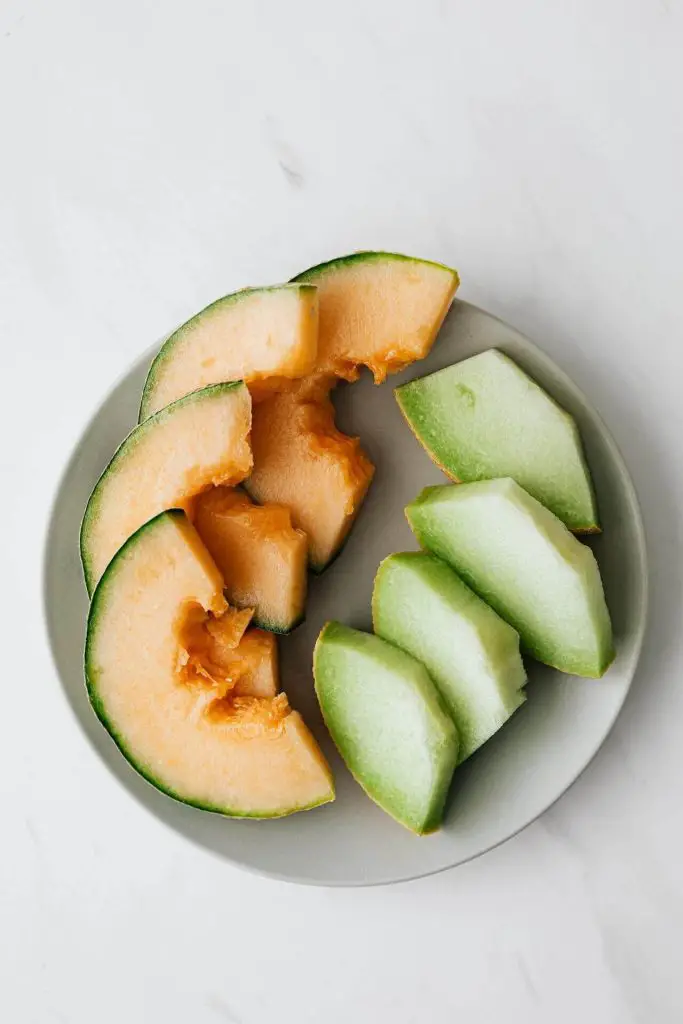
6. Lettuce
Lettuce has a gentle root system that will not disturb the delicate roots of the cantaloupes. Lettuce grows quickly and also helps to keep the soil cool and moist. This type of soil is good for the cantaloupes.
7. Spinach
Spinach and cantaloupes complement each other because they have common enemies like aphids. They help each other by repelling these pests.
Cantaloupes provide spinach plants with a good shade which keeps the spinach plants cool even if it is hot weather.
When planting these companion plants, please ensure that you leave plenty of space between the two plants.
8. Collard Greens
Collard greens are also very good companion plants for cantaloupes. Their fleshy leaves reduce the evaporation of water from the soil.
Since collard greens grow tall, their leaves provide shade to the cantaloupe plants.
Another benefit of collard greens is that they attract beneficial insects like ladybugs and lacewings. These beneficial bugs destroy harmful pests.
9. Bush beans
Bush beans support the cantaloupes by keeping the fruits above the ground. This helps to prevent the cantaloupes from rotting.
Bush beans also enrich the soil with nitrogen and thus provide rich nutrition for the cantaloupes.
The cantaloupes also provide shade for the bush bean plants which keeps the soil moist.
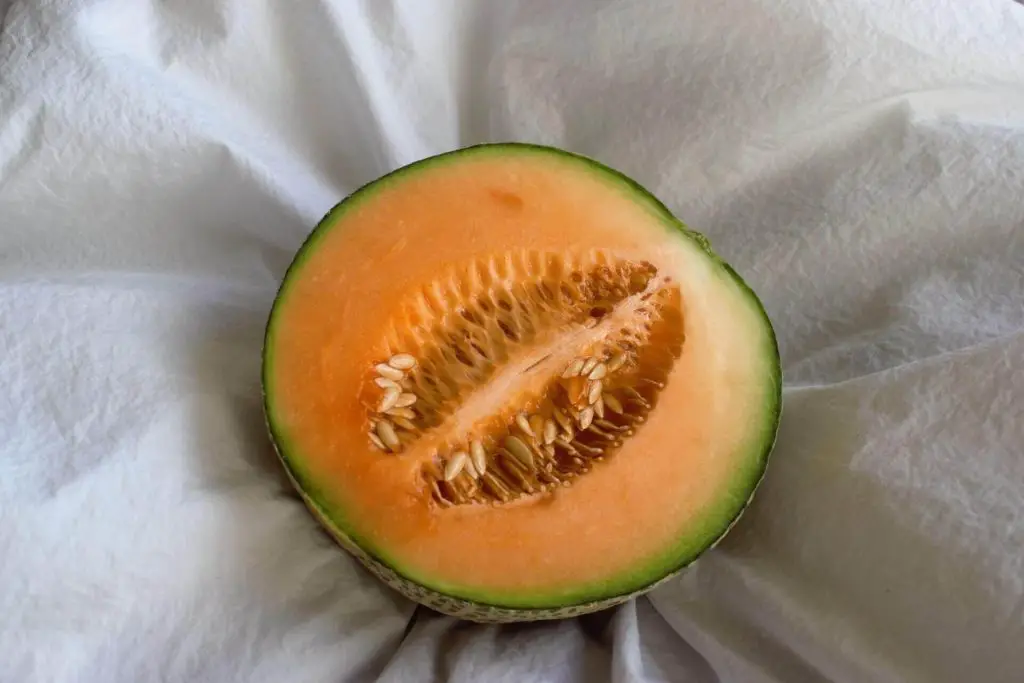
10. Corn
Corn attracts beneficial insects, like lacewings and ladybugs which in turn control harmful pests. Corn is a very helpful companion plant.
11. Bee balm
Bee balm, as the name suggests, attracts many honey bees. These honey bees facilitate pollination but they also help in repelling harmful insects.
The bee palm plant has a very strong minty fragrance that repels harmful insects. Moreover, bee palms are very easy to grow and are an asset in the garden.
They grow well even in drought areas and don’t require a lot of water. You can add fertilizers such as 10-10-10 so that the plant grows healthy and is fruitful.
12. Alliums
Alliums belong to the family which includes garlic chives and leeks. They have sulfurous compounds that repel pests and diseases.
When you plant alliums next to the cantaloupes, they protect the cantaloupes from nematodes, aphids, and cucumber beetles.
13. Nasturtiums
Nasturtiums have pretty flowers that attract beneficial insects like ladybugs and bees. Nasturtiums also add a beautiful splash of color to the garden.
14. Basil
Basil is another good companion plant for cantaloupes. It grows well with cantaloupe. You can try to add cinnamon basil to your garden.
15. Carrots
Carrots loosen the soil and make it conducive for the growth of cantaloupe plants. So carrots are good companion plants for cantaloupes.
Related posts
- 25 Companion Plants For Rhubarb, Which to Avoid & Growing Tips!
- 15 Companion Plants For Asparagus To Help It THRIVE! [2023]
- 17 Companion Plants For Kale & What To Avoid!
What Is Companion Planting?
Before going any further we need to understand what exactly is companion planting. Well, companion planting is nothing but the growing of certain plants next to other plants so that they can benefit each other with their good qualities.
One example could be the planting of tall plants next to short plants to protect them from damage caused by wind storms. The concept of companion planting also helps prevent insects from invading the main plants.
Companion planting in many cases even improves the soil health so that the main plants can grow in healthy soil.
In the United States, there are several companion planting melons like watermelon, honeydew, and cantaloupes or muskmelons. These melons can be planted with other plants for mutual benefit.
One popular companion planting combination is called the Three Sisters – corn, beans, and squash. These three plants when planted near each other provide structure, protection, and soil enrichment for healthy plants.
The beans climb the corn plants as it provides a good structure. The beans plant nitrogen in the soil so that all three plants can benefit from this enriched soil.
The squash plant spreads along the ground and provides shade from the sun as well as stops weeds from growing.
Companion planting is a very simple, effective, and natural way to have a healthy and productive Garden. Gardeners can benefit from companion planting through increased yield, pest control, and enriched soil.
Companion planting is not an exact science but it is beneficial and effective to grow healthy plants.
What Are The Optimal Growing Conditions For Cantaloupes?
Cantaloupes are one type of melon and they are grown throughout the world. The actual growing conditions for cantaloupes depend on the climate.
Usually, cantaloupes grow better where the weather is warm and there is ample sunshine. cantaloupes grow well in organically rich, well-drained soil.
In the United States, cantaloupes can be planted outdoors in late spring or early summer. They have to be planted in areas that have a lot of sunshine and good soil. cantaloupes should be planted at a distance of 3-4 feet from each other.
The Benefits Of Using Companion Plants For Cantaloupes
In case you are thinking about growing cantaloupes, you must know the benefits of using companion plants. Companion planting with cantaloupes can provide several benefits, including pest control, improved pollination, and increased yields.
Companion plants act as pest controllers. They are also useful in improved pollination and an increased harvest. Pest control is the most important benefit of companion plants.
Pests like squash bugs, cucumber beetles, and aphids attack cantaloupe plants all the time. Companion planting for cantaloupes is also helpful as it attracts beneficial insects that destroy the pests.
Another great benefit of companion plants is that they attract bees to the garden and these bees improve pollination.
Finally, companion plants help in increasing the harvest because they provide an overall fertile environment for the plants to grow healthy.

What Not To Plant With Cantaloupes
1. Cucumbers
Cucumbers are known to attract harmful insects like beetles and so if planted near cantaloupes, they will be harmful to the cantaloupes
Both cantaloupes and Cucumbers belong to the Cucurbitaceae family. Thus, they attract the same harmful pests and bugs.
2. Potatoes
It is better to avoid planting potatoes near cantaloupes as potatoes attract harmful aphid pests. Aphids can be very harmful to plants and it is better to avoid potatoes for this reason.
3. Pumpkins
Pumpkins too attract harmful insects and bugs which can destroy cantaloupe plants. So, it is better not to plant pumpkins next to cantaloupes.
Here Are Some Great Tricks For Growing Cantaloupe
Many people wonder how to plant cantaloupe plants.
Given below are some helpful ways to grow good cantaloupe plants.
1. Pick A Sunny Area
Cantaloupes grow best in areas that have a lot of sunshine. So always plant cantaloupes in sunny areas. Cantaloupes grow best and thrive in warmer climates.
2. Select Cantaloupe Types Best Suited For Your Environment
Here are a few types of cantaloupes:
- Minnesota Midget
This is a short-season plant. The mature cantaloupes grow in a period of about 60 to 70 days. This particular variety grows well in cooler climates but it can also grow in a variety of different climates. It is very sweet and juicy.
- Ambrosia
Ambrosia is a very flavourful, sweet, and exotic type of cantaloupe. This type of cantaloupe is sweet right up to its rind. It has beautiful red-colored flesh.
- Hearts Of Gold
This type of cantaloupe is orange in color, juicy, and very sweet. This takes only 70 to 80 days for the mature fruit to form. So if you want some cantaloupes that grow fast then you can plant this variety.
- Mini Sugar Cube
This variety of cantaloupes is small in size and less weighty but they are very flavourful. Mini sugar cube cantaloupes are easy to grow and the fruit appears quickly.
The full fruit can be harvested in 80 days. It has great resistance to disease and harmful insects.
- Planters Jumbo
The planters jumbo cantaloupes are juicy, extremely sweet, attractive, and orange in color. They are mildew-resistant and grow well even in areas of drought.
3. Plant In Raised Heaps Or Mounds
It is always helpful to plant cantaloupes in raised mounds or heaps. This will ensure that the roots remain moist and warm.
4. Use Black Plastic Compost
Black plastic fertilizer helps to keep the plant moist and also keeps harmful insects at bay.
5. Keep Plants Well-Watered
Cantaloupe plants require a lot of water. Make sure that you water the plants regularly and check if the plant looks wilted. It is advisable to keep on watering the plants at least weekly.
6. Use Compost Tea To Fertilize
Compost tea is a very good fertilizer for cantaloupe plants. You can make it at home by adding fish emulsion and seaweed.
7. Shield From Frost
Cantaloupes need to be protected from frost. Whenever there is excessive frost, make sure that you cover the plants with clothes or blankets. This will ensure that the plants remain warm and bear a good harvest.
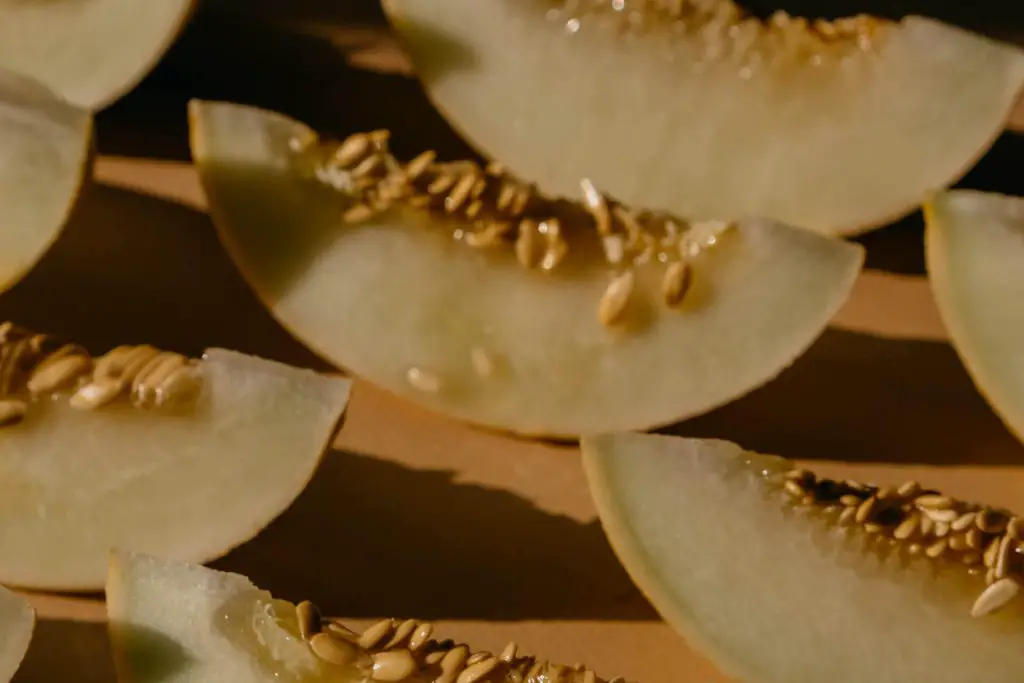
FAQs On Companion Plants For Cantaloupe
What Herbs Grow Well With Cantaloupe?
Do you know what herbs grow well with cantaloupe? Several plants deter harmful insects like aphids, beetles, and nematodes that are very harmful to cantaloupe plants. These herbs include cilantro, onions, garlic, chives, anise, radish, and petunias. These plants stand as a guard against harmful pests and protect the cantaloupes.
Can You Plant Carrots Next To Cantaloupe?
Can carrots be planted next to cantaloupe? Melons like cantaloupe are very good to plant with companion plants. They grow well when planted along with plants like okra, spinach, lettuce, sunflowers, kale, carrots, cabbage, and broccoli.
Other great companion plants for cantaloupe are garlic, chives, leeks, onions, peas, pole beans, bush beans, and corn.
Can Cantaloupe Be Planted Near Zucchini?
It is best to avoid planting zucchini and summer squash with all other vining plants that include pumpkins, sweet potatoes, cucumbers, and winter squashes.
If you’re looking to add some new plants to your garden this year, why not try companion planting with cantaloupe? Companion planting is a great way to improve yields and deter pests.
Related Posts





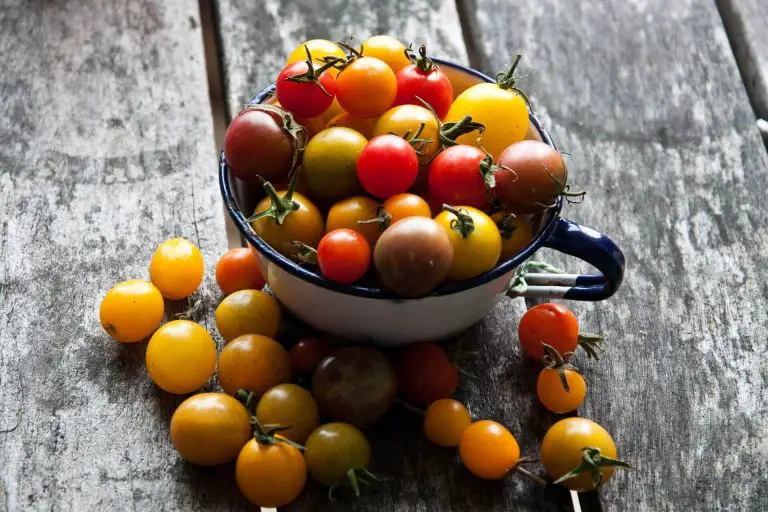
![7 White Winter Plants For A Cheerful Winter![2023]](https://aboveandbeyondgardening.com/wp-content/uploads/2022/10/White-winter-plants-768x512.jpg)

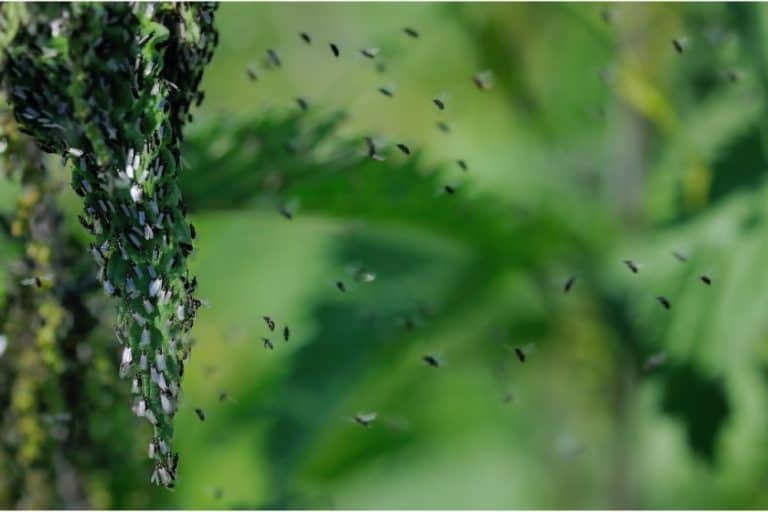

![How To Grow Tomatoes Without A Garden + Unique Growing Tips! [2022]](https://aboveandbeyondgardening.com/wp-content/uploads/2022/08/how-to-grow-tomatoes-without-a-garden-7-1-768x512.jpg)